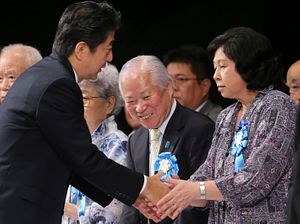High-level leaders of all but one of the nations that joined North Korea in the defunct Six-Party Talks have met with North Korean leader Kim Jong Un in the last two months. The lone exception: Japan.
It did not have to be this way – last month, at the Singapore summit with U.S. President Donald Trump, Kim reportedly said he was “open” to meeting Prime Minister Shinzo Abe. But today North Korea keeps Japan out of the denuclearization process, and refuses to meet until Japan ends military exercises. This absence of Japan, a neighboring U.S. ally, from peninsular diplomacy harms denuclearization prospects.
While the intentions behind the North Korean reverse-course are unclear, Japan’s maximalist position on the abduction issue probably is not helping. Japan demands the return of all 17 government-recognized nationals kidnapped by North Korean operatives from 1977 to 1983 alive, despite North Korean insistence that all the victims, except for the five returned in 2002, are either deceased or were never abducted.
When Japan repeated its position days after the Singapore summit as a prerequisite for holding top-level discussions with Kim, North Korean propaganda reasserted the country’s position that the abduction issue has already been resolved, to Japan’s dismay – Pyongyang had refrained from repeating that talking point in Singapore.
The abduction issue is a hurdle unique to Japan that poisons its relations with North Korea, leaving it sidelined in peninsular diplomacy. Indeed, Jeff Kingston, director of Asian Studies at Temple University, says the abduction issue has “ticked Pyongyang off to the point that they see Japan as playing the role of the spoiler.”
The maximalist demand from Tokyo is peculiar: why would Japan prioritize 17 individuals over an existential nuclear threat? The domestic politics driving this demand must be understood to get a key player reintegrated into regional diplomacy.
While the abduction issue is understandably an emotional one — some call it Japan’s Iranian hostage crisis — it was not inevitable that it become a non-negotiable obstacle in the North Korea-Japan relationship. North Korea abducted more than 100,000 South Koreans during and after the Korean War, but this has not stalled inter-Korea rapprochement.
Most Japanese were uninterested in the abductee issue until the turn of the century, with leftist parties even claiming in 1997 that the government fabricated the abductee issue to deny aid to North Korea, a country publically perceived more as a topic for a best-selling satirical book than a serious concern.
Abe, however, changed this situation by politicizing the abduction issue, fueling his meteoric rise to power.
Abe started working on the abduction issue in the early 1990s while serving as secretary to his father, former Foreign Minister Shintaro Abe. As the abduction issue entered the national conversation in the early 2000s, the future prime minister leveraged his decade of experience on the issue to establish himself as a maximalist hardliner. He demanded the repatriation of all abductees before concessions, earning national acclaim as “Abduction Abe.”
Abe used his understanding of the abductee issue to gain clout in Prime Minister Junichiro Koizumi’s administration, advising him to walk away from the table absent a formal North Korean apology, an expectation which Kim Jong Il acquiesced to. Abe also allegedly masterminded the 2002 decision to permanently keep in Japan the abductees returned by North Korea for a temporary visit.
Cashing in popular support and political power built on the abductee issue, Abe soon became Japan’s youngest post-war prime minister in 2006.
Twelve years later, the issue restricts Abe as he faces a tough leadership contest this September, in which Liberal Democratic Party (LDP) Diet members and cardholders will vote on whether to keep him in power.
The Diet’s interparty caucus for the abduction issue, which includes several influential LDP veterans, has repeatedly pressured Abe to maintain pressure on North Korea until the issue is resolved. Détente with North Korea against their counsel will harm Abe’s career prospects.
Meanwhile, the civil society organ promoting the issue maintains a local presence in 33 of the 46 prefectures, with plans to inaugurate a 200 person-plus coalition of Osaka MPs. Their grassroots campaign will likely pressure voting cardholders.
Furthermore, Shigeru Ishiba, the top contender for Abe’s seat, has a strong reputation as an abduction issue hardliner he can leverage if Abe appears weak on North Korea.
But even if Ishiba wins, the same pressure will continue to affect any prime minister, restricting Japanese diplomacy.
Ironically, maybe Abe can break that stalemate, precisely because he is arguably the personification of the abduction issue. Families of abductees still trust the prime minister as one of their own. If he tells them — and the rest of Japan — that the country needs to adjust its expectations regarding the issue, maybe they will accept the reality.
As the foremost North Korea maximalist, only Abe can pivot Japanese peninsular policy. The Nixonian maneuver would doubtless be politically costly and risky – but necessary if Japan is to re-engage North Korea.
Yuichiro Kakutani is an intern at the Stimson Center’s East Asia program.

































